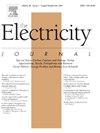将社区参与融入决策:提高能源系统公平性的持续过程
IF 2.2
Q1 Social Sciences
引用次数: 0
摘要
从历史上看,公用事业公司和州能源监管机构在制定计划和政策的过程中很晚才纳入社区参与,通常是在大部分或所有决策已经做出之后。随着越来越多的机构寻求解决能源不公平问题,他们以各种方式让利益相关者参与到项目开发的不同阶段,并取得了不同程度的成功。在本文中,我们提出了一种持续参与和反馈的方法来改善和评估系统公平性,将参与规划和决策过程作为一个综合周期。我们举例说明了如何提高参与度、制定接收和采纳反馈意见的结构和流程,以及如何衡量成果。由于其他社会经济和历史条件的影响,以及不公平体验的定性性质,公平成果尤其难以衡量。为了确定一系列可以通过提高参与度来影响的公平结果,我们研究了监管机构、公用事业公司和社区之间的关系,并提出将参与度和持续反馈纳入这些组织的正常职能中可以改善能源系统用户的结果。本文章由计算机程序翻译,如有差异,请以英文原文为准。
Folding community engagement into decision making: A continuous process to increase equity in the energy system
Utilities and state energy regulators have historically incorporated community participation late in the process of creating programs and policies, often after most or all decisions have already been made. As more organizations seek to address energy inequity, they have engaged stakeholders in a variety of ways and at different stages of program development with varying levels of success. In this paper, we propose a continuous participation and feedback approach to system equity improvements and evaluation that incorporates engagement in planning and decision making processes as an integrated cycle. We provide example methods for increasing participation, developing structures and processes to receive and incorporate feedback, and measuring outcomes. Equity outcomes are particularly difficult to measure due to the impact of other socioeconomic and historic conditions, as well as the qualitative nature of experiences of inequity. To identify a set of equity outcomes that can be impacted by increased participation, we examine the relationship between regulators, utilities, and the community, and propose that folding engagement and continuous feedback into the normal functions of these organizations can improve the outcomes for energy system users.
求助全文
通过发布文献求助,成功后即可免费获取论文全文。
去求助
来源期刊

Electricity Journal
Business, Management and Accounting-Business and International Management
CiteScore
5.80
自引率
0.00%
发文量
95
审稿时长
31 days
期刊介绍:
The Electricity Journal is the leading journal in electric power policy. The journal deals primarily with fuel diversity and the energy mix needed for optimal energy market performance, and therefore covers the full spectrum of energy, from coal, nuclear, natural gas and oil, to renewable energy sources including hydro, solar, geothermal and wind power. Recently, the journal has been publishing in emerging areas including energy storage, microgrid strategies, dynamic pricing, cyber security, climate change, cap and trade, distributed generation, net metering, transmission and generation market dynamics. The Electricity Journal aims to bring together the most thoughtful and influential thinkers globally from across industry, practitioners, government, policymakers and academia. The Editorial Advisory Board is comprised of electric industry thought leaders who have served as regulators, consultants, litigators, and market advocates. Their collective experience helps ensure that the most relevant and thought-provoking issues are presented to our readers, and helps navigate the emerging shape and design of the electricity/energy industry.
 求助内容:
求助内容: 应助结果提醒方式:
应助结果提醒方式:


